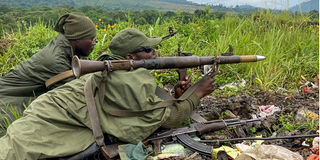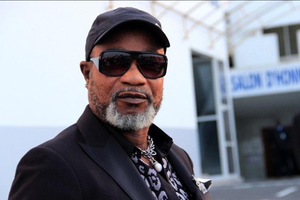
Armed Forces of the Democratic Republic of Congo (FARDC) soldiers take their positions outside Goma on May 28, 2022.
Smuggling had been a rumour in the Democratic Republic of Congo for years. Then came reports that hundreds of rebel groups fighting in the east of the country had remained strong, fuelled by money from smuggled minerals and timber.
This week, the United States of America weighed in, expressing concern that this kind of trade is making it difficult to tame the flow of weapons to the battlefield. It's not the first time Washington has linked the illegal trade in minerals to the perpetuation of war.
A UN panel of experts on the Congo and various rights watchdogs have said as much before.
“The United States remains concerned about the role that the illicit trade and exploitation of certain minerals, including gold and tantalum mined artisanally and semi-industrially in the African Great Lakes region, continues to play in financing the conflict.
“It is clear that some traders, sometimes with the support of various armed groups and security services, are transporting and exporting significant quantities of Congolese minerals out of the country," the US government statement said, adding that "in many cases, these minerals directly or indirectly benefit armed groups and leave the country via Rwanda and Uganda before being transported to the main refining and processing countries. These supply chains facilitate the illicit exploitation and taxation of these minerals, often involving acts of corruption.”
In the past, Rwanda's President Paul Kagame has acknowledged that smugglers use routes in his country. But he argued that the blame lay squarely with Western traders who provided an unfettered market for looters.
In eastern DRC, smuggling, war and the illicit arms trade have been going on for nearly 25 years, and hope for an end to these practices is slim. The DRC appears to be struggling to overcome local and foreign armed groups operating in vast areas where the public and security services are not necessarily present.
The problem is particularly complex in the DRC, where artisanal mining is legal and provides food for thousands of families. Congo's mining law only requires operators to join cooperatives to have the right to mine. This openness of the law, coupled with the chaos of insecurity, has created a situation in eastern Congo that is difficult to manage.
Washington is also concerned about the extraction, transport and export of minerals, which it says have led to a wide range of human and labour rights abuses, including forced labour, the worst forms of child labour, violations of the minimum age for employment in the DRC, and sexual and gender-based violence, particularly in certain artisanal mining areas.
When the DRC and Rwanda signed an agreement in June to jointly exploit gold, one of the reasons given for establishing this cooperation was to "deprive armed groups of income from the gold industry", according to a press release from the DRC presidency.
In Kinshasa, officials called it "the economic response" to the conflict in the east of the country. That deal, like several others, has since been suspended as the two countries bicker over the M23 rebels, now considered a terrorist group in Kinshasa.
Instead, war has resumed and illegal exploitation and trafficking have flourished in an area where the sound of gunfire and all the misery it brings is deafening.
The US government further asserts that the situation is worsening due to "control, first by the PARECO armed group and then by the Rwanda-backed M23 armed group in April 2024, of a key tantalum mining area near the Congolese town of Rubaya (eastern Congo) and control by non-state armed groups of gold mining areas in the provinces of Fizi, South Kivu and Ituri, among others, as well as weak governance of natural resources and imperfect traceability initiatives managed by the industry on the ground in the DRC and Rwanda".
The armed groups are particularly targeting tantalum, of which the DRC is the world's leading producer. The mineral is considered a "critical ore" by the US Geological Survey and the US Department of Energy, and the DRC is the world's leading producer.
The DRC has tried to use legal means to curb the insatiable appetite of Western companies, which it accuses of fuelling illegal mining.
Recently, Kinshasa hired some lawyers to sue Apple, the American technology giant that makes iPhones.
The legal team, from the Robert Amsterdam law firm, is said to be “working closely with us in the action we have taken against Apple because today we want to be able to trace all those who benefit from (mining) products that are being smuggled out of the country,” said government spokesman Patrick Muyaya.
“We are putting pressure on all those who benefit directly or indirectly from the products of the murders and other crimes committed by Rwanda, and we are sure that this work will eventually succeed, but it will take time. This will be the best form of economic sanctions for those who, for 25 years, have built their economic model on the pillaging of the DRC's resources.”
Even today, DRC officials say they regret that cooperation with Rwanda on this issue didn't last.
“We thought that, as neighbours, we could cooperate economically with the necessary transparency. But it's clear that for Rwanda, the best way to live is through theft, rape and systematic pillaging, which began 25 years ago. But this time, it's the beginning of the end," Muyaya said.
The DRC has activated what it calls the "judicial front", among four other "fronts", in the search for peace. Through its lawyers, the DR Congo has filed a formal complaint against the American giant Apple, accusing it of using illegally mined minerals in its high-tech products and smartphones. The mining is linked to conflict and human rights violations, fuelled in particular by regional tensions with Rwanda.
"It is crucial to demonstrate the bloody impact of this exploitation on the end products. Apple, like other multinationals, must be held accountable," said Robert Amsterdam and William Bourdon, the lawyers representing DRC. They hope the lawsuit will force the company to rethink its sourcing.
Apple has in the past denied profiting from illegal mining. In an earlier report this year, the company said it documents the background of every supplier to ensure that the metals it buys are not the result of conflict, child labour, smuggling or other human rights abuses.
Virtually all experts agree that a holistic approach is the best way to tackle the war in eastern DRC: Economic efforts must be accompanied by a robust political or diplomatic approach.
As part of the diplomatic effort, the United States of America proposed and obtained a "humanitarian" ceasefire between Rwanda and the DRC from the parties involved in the Congolese conflict.
This 14-day ceasefire, from July 5 to 19, paves the way for the return of peace in the east of the DRC, which has been plagued by violence for decades, said the Minister of Foreign Affairs, Thérèse Kayikwamba Wagner. The minister warned, however, that "a truce does not mean that we are not vigilant".







